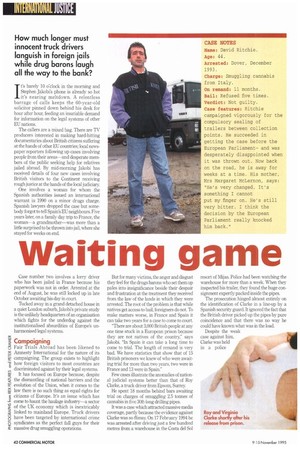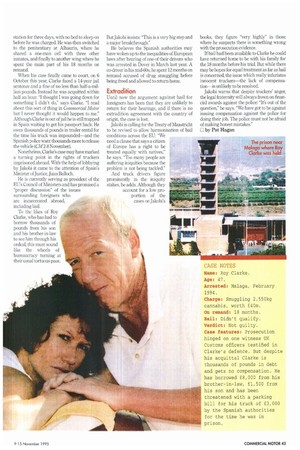Waiting game
Page 54

Page 55

If you've noticed an error in this article please click here to report it so we can fix it.
How much longer must innocent truck drivers languish in foreign jails while drug barons laugh all the way to the bank?
It's barely 10 o'clock in the morning and Stephen jakobi's phone is already so hot it's nearing meltdown. A relentless barrage of calls keeps the 60-year-old solicitor pinned down behind his desk for hour after hour, feeding an insatiable demand for information on the legal systems of other EU nations.
The callers are a mixed bag. There are TV producers interested in making hard-hitting documentaries about British citizens suffering at the hands of other EU countries; local newspaper reporters following up cases involving people from their areas—and desperate members of the public seeking help for relatives jailed abroad. By mid-morning jakobi has received details of four new cases involving British visitors to the Continent receiving rough justice at the hands of the local judiciary.
One involves a woman for whom the Spanish authorities issued an international warrant in 1990 on a minor drugs charge. Spanish lawyers dropped the case but somebody forgot to tell Spain's EU neighbours. Five years later, on a family day trip to France, the woman a grandmother—was more than a little surprised to be thrown into jail, where she stayed for weeks on end.
Case number two involves a lorry driver who has been jailed in France because his paperwork was not in order. Arrested at the end of August, he was still locked up in late October awaiting his day in court.
Tucked away in a grand detached house in a quiet London suburb, Jakobi's private study is the unlikely headquarters of an organisation which fights for the underdog against the institutionalised absurdities of Europe's unharmonised legal systems.
Campaigning
Fair Trials Abroad has been likened to Amnesty International for the nature of its campaigning. The group exists to highlight how foreign visitors to most countries are discriminated against by their legal systems.
It has focused on Europe because, despite the dismantling of national barriers and the evolution of the Union, when it comes to the law there is no such thing as equal rights for citizens of Europe. It's an issue which has come to haunt the haulage industry—a sector of the UK economy which is inextricably linked to mainland Europe. Truck drivers have been targeted by international crime syndicates as the perfect fall guys for their massive drug smuggling operations. But for many victims, the anger and disgust they feel for the drugs barons who set them up pales into insignificance beside their despair and frustration at the treatment they received from the law of the lands in which they were arrested. The root of the problem is that while natives get access to bail, foreigners do not. To make matters worse, in France and Spain it can take two years for a case to come to court.
"There are about 3,000 British people at any one time stuck in a European prison because they are not natives of the country," says Jakobi. "In Spain it can take a long time to come to trial. The length of remand is very bad. We have statistics that show that of 15 British prisoners we knew of who were awaiting trial for more than two years, two were in France and 13 were in Spain."
Few cases illustrate the anomalies of national judicial systems better than that of Roy Clarke, a truck driver from Epsom, Surrey He spent 18 months behind bars awaiting trial on charges of smuggling 2.5 tonnes of cannabis in five 30ft-long drilling pipes.
It was a case which attracted massive media coverage, partly because the evidence against Clarke was so flimsy. On 17 February 1994 he was arrested after driving just a few hundred metres from a warehouse in the Costa del Sol resort of Mijas. Police had been watching the warehouse for more than a week. When they inspected his trailer, they found the huge consignment expertly packed inside the pipes.
The prosecution hinged almost entirety on the identification of Clarke in a line-up by a Spanish security guard. It ignored the fact that the British driver picked up the pipes by pure coincidence and that there was no way he could have known what was in the load.
Despite the weak case against him, Clarke was held in a police station for three days, with no bed to sleep on before he was charged. He was then switched to the penitentiary at Alhaurin, where he shared a one-man cell with three other inmates, and finally to another wing where he spent the main part of his 18 months on remand.
When his case finally came to court, on 6 October this year, Clarke faced a 14-year jail sentence and a fine of no less than half-a-million pounds. Instead he was acquitted within half an hour. "I thought I was going down for something I didn't do," says Clarke. "I read about this sort of thing in Commercial Motor but I never thought it would happen to me." Although Clarke is out of jail he is still trapped in Spain waiting to get his passport back. He owes thousands of pounds in trailer rental for the time his truck was impounded and the Spanish police want thousands more to release the vehicle (CM 2-8 November).
Nonetheless, Clarke's case may have marked a turning point in the rights of truckers imprisoned abroad, With the help of lobbying by Jakobi it came to the attention of Spain's Minister of Justice, Juan Balloch, fie is currently serving as president of the EU's Council of Ministers and has promised a proper discussion" of the issues surrounding foreigners who are incarcerated abroad, including bail.
To the likes of Roy Clarke, who has had to borrow thousands of pounds from his son and his brother-in-law to see him through his ordeal, this must sound like the wheels of bureaucracy turning at their usual tortuous pace. But Jakobi insists: "This is a very big step and a major breakthrough."
He believes the Spanish authorities may have woken up to the inequalities of European laws after hearing of one of their drivers who was arrested in Dover in March last year. A co-driver in his mid-60s, he spent 12 months on remand accused of drug smuggling before being freed and allowed to return home,
Extradition
Until now the argument against bail for foreigners has been that they are unlikely to return for their hearings, and if there is no extradition agreement with the country of origin, the case is lost.
Jakobi is calling for the Treaty of Maastricht to be revised to allow harmonisation of bail conditions across the EU: "We need a clause that says a citizen of Europe has a right to be treated equally with natives," he says. "Too many people are suffering iniquities because the problem is not being tackled."
And truck drivers figure prominently in the iniquity let stakes, he adds. Although they account for a low proportion of the cases on Jakobi's books, they figure "very highly" in those where he suspects there is something wrong with the prosecution evidence.
If bail had been available to Clarke he could have returned home to be with his family for the 18 months before his trial. But while there may be hopes for equal treatment as far as bail is concerned, the issue which really infuriates innocent truckers—the lack of compensation—is unlikely to be resolved, Jakobi warns that despite truckers' anger, the legal fraternity will always frown on financial awards against the police: "It's out of the question," he says. "We have got to be against issuing compensation against the police for doing their job. The police must not be afraid of making honest mistakes."
C by Pat Hagan
CASE NOTES Name: David Ritchie.
Age: 44.
Arrested: Dover, December 1993.
Charge: Smuggling cannabis from Italy.
On remand: 11 months.
Bail: Refused Eve times. Verdict: Not guilty.
Case features: Ritchie campaigned vigorously for the compulsory sealing of trailers between collection points. He succeeded in getting the case before the European Parliament– and was desperately disappointed when it was thrown out. Now back on the road, he is away for weeks at a time. His mother, Mrs Margaret McLernon, says: "He's very changed. It's something I cannot put my finger on. He's still very hitter. I think the decision by the European Parliament really knocked him hack."
CASE NOTES
Name: Roy Clarke, Age: 47.
Arrested: Malaga, February 1994.
Charge: Smuggling 2,550kg cannabis, worth £40m.
On remand: 18 months.
Bail: Didn't qualify. Verdict: Not guilty.
Case features: Prosecution hinged on one witness UK Customs officers testified in Clarke's defence. But despite his acquittal Clarke is thousands of pounds in debt and gets no compensation. He has borrowed £8,000 from his brother-in-law, £1,500 from his son and has been threatened with a parking bill for his truck of £3,000 by the Spanish authorities for the time he was in prison.




















































































































